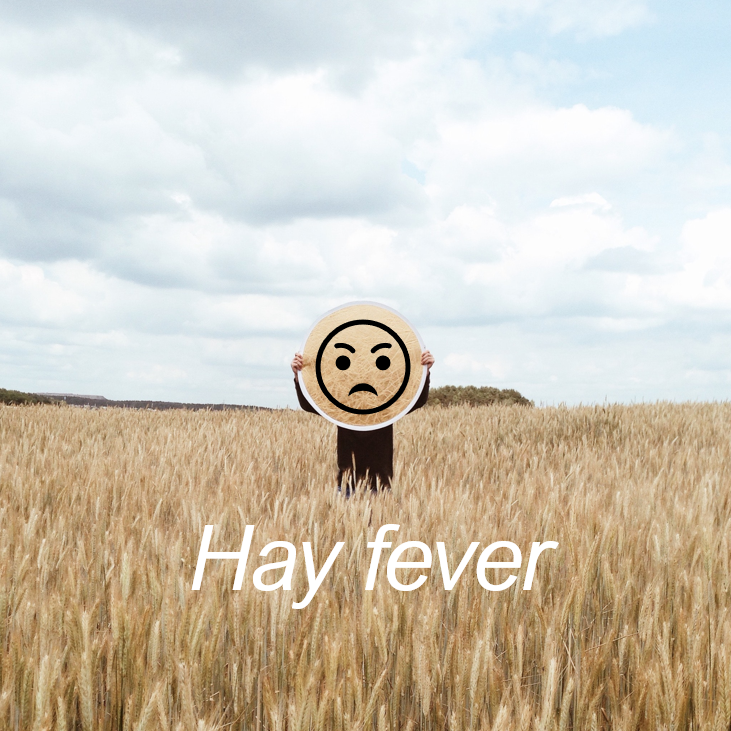Have you ever thought about the phrase ‘hay fever’ before? We all know what it means, it conjures images of sneezing, wheezing, watery eyes and swollen stuffy noses, but it has absolutely nothing to do with hay or fever.
The correct term should actually be ‘allergic rhinitis’ but that doesn’t roll off the tongue so easily. Hardly anyone uses this term in normal every day language except for doctors and allergists.

History of hay fever
It’s a relatively new term or ‘disease’ and only really became know as hay fever in about 1825; people were thought to have a fever from the smell of hay, which we now know is not the case. It was also referred to as ‘hay asthma’ or ‘summer catarrh‘.
Disease is a funny one too. It sounds serious, like really bad. A disease sounds like you’d need medication, hospitalisation and a specialist but the real meaning of the word is just dis-ease – the body is unhappy. It is not at ease with itself. It needs help!
If you’re interested in finding out more about the origins of hay fever, read 6 facts about the history of hay fever by Rachel Dinning which is very interesting.
I think it’s also important to note the different words we use to describe allergies, such as allergy, anaphylaxis, allergic shock, food sensitivity or intolerance!
They are all very different yet get used interchangeably.
I have a milk / dairy allergy and often get described as lactose intolerant. The two are very different. An allergy means you cannot consume proteins from certain foods and an intolerance means you struggle with the sugar in that food.
I also use the word ‘milk allergy’ often and specifically list the food types e.g. milk, cheese, butter, yogurt and cream. The reason being that people often misunderstand what dairy means. The amount of times I get brought the gluten free menu after mentioning my very serious dairy allergy is enough to worry me!
People often also assume that eggs are dairy. Nope. You ever seen a cow lay an egg? Yet they do seem to get lumped together.
The word allergy can mean different things to different people too.
An allergy could be hay fever or a mild food allergy or it could mean life threatening anaphylactic reactions and in extreme and thankfully rare cases, death!
It frustrates me how often I hear all these terms being misused.
If you don’t have an allergy, don’t say that you do. Use the right language.
Because every time you go into a restaurant and say you have an allergy to dairy or wheat and then order a dessert that contains that food, you’re not only putting all those with life threatening allergies at risk, you’re also annoying the staff. They have likely taken precautions to keep you safe and you appear to not have required such extra care!
If you can eat small amounts of dairy but would like a dairy free main meal, so that you can safely indulge in the pudding, say so. Tell them you have a serious food intolerance, but that it’s not life threatening. Tell them you don’t have adrenaline you just would like to know you won’t get over dosed with dairy as that will make you feel very unwell.
We have to all start taking responsibility for our actions and our language. That means all of you people who just want to avoid these allergens for lifestyle reasons anyone with a food intolerance.
Don’t say you have an allergy when it’s not true.
If you don’t like a certain food, say so. Don’t say you’re allergic to foods you just don’t like the taste or mouth feel of. That’s just plain daft.
We need allergy for ourselves. We need allergy to communicate that we could be at risk of a serious life threatening allergic reaction.
We need everyone to use the correct language.
Personally I think allergy as a word isn’t really cutting it. Anaphylaxis sounds more serious but isn’t widely understood.
What language do you use when you speak to waiting staff? I always feel that more words help, like explaining it’s a life threatening allergy that causes anaphylaxis, which is why I carry adrenaline!
What word work best? What language should we be using to communicate to people about our allergies?
Photo by Maksim Goncharenok from Pexels












people currently suffering from rhinitis and ‘hay fever symptoms’ are suffering from MOULD allergy which starts in August. This is so often not understood by the medical profession The Aerobiology unit at Worcester University give. a lot of information and details of when moulds occur and symptoms caused.
The problem also is that during some months we do have a pollen count but never a count Of which actual allergen it’s counting eg. Beech, birch, alder, grass, weeds, mould, wheat, and I could on. Most people with hay fever don’t even know what they’re allergic to. It’s a ridiculously unhelpful situation. But it is what it is. And then there’s the indoor pollution and allergens like dust! Hay fever symptom could literally be caused by so many things.
The problem is, is that we have very few allergy clinics and immunology clinics in the UK.
We have a history of allergy in the family and yet we have never properly been tested to know the full extent.
Going private in the UK is very expensive, yet you feel you have no choice.
Hi Doreen, yes you are very correct, so few experts. And long waiting lists, if you can even get referred for testing. I don’t know the costs to go private but I can imagine it’s not cheap. I don’t things are going to get any easier. And there is very poor awareness and understanding amongst the general public of what allergies can really mean.
I totally agree with you Ruth but this needs to go to the wider population so that they don’t so perhaps you can put a larger piece in a newspaper or magazine that reaches more of the population than your blog as good as it is
Oh 100% you’re right! I need to get this published in a main stream publication! Cos hardly anyone reads my blog. LOLS
Great idea though. I should start to try to get space in some of these newspapers.
I’ve always been very clear when eating out that I am not allergic to milk, I just can’t happily or comfortably consume it. I used to think that this would mean waiting staff wouldn’t take it seriously but now understand that it simply gives them the cue they need as to the level of care and attention they must take preparing my food, which is excellent.
It really helps! Thank you Cress for getting it. I know you do. Because if I hear one more person say they have an allergy to anything that they can actually eat I will not be held responsible! It makes my blood boil. And it really annoys the chefs, waiters and business owners who are serving us.
PS I LOVE this blog – it’s fab, and YES you must try harder to get it onto the front page of several broadsheets please. Push aside boring things like Brexit & COVID & US Elections – “Nowt to do with Hay or Fever”!!
It is a message that the world needs to hear, not just my five readers LOL. Let’s see if I can make that happen!